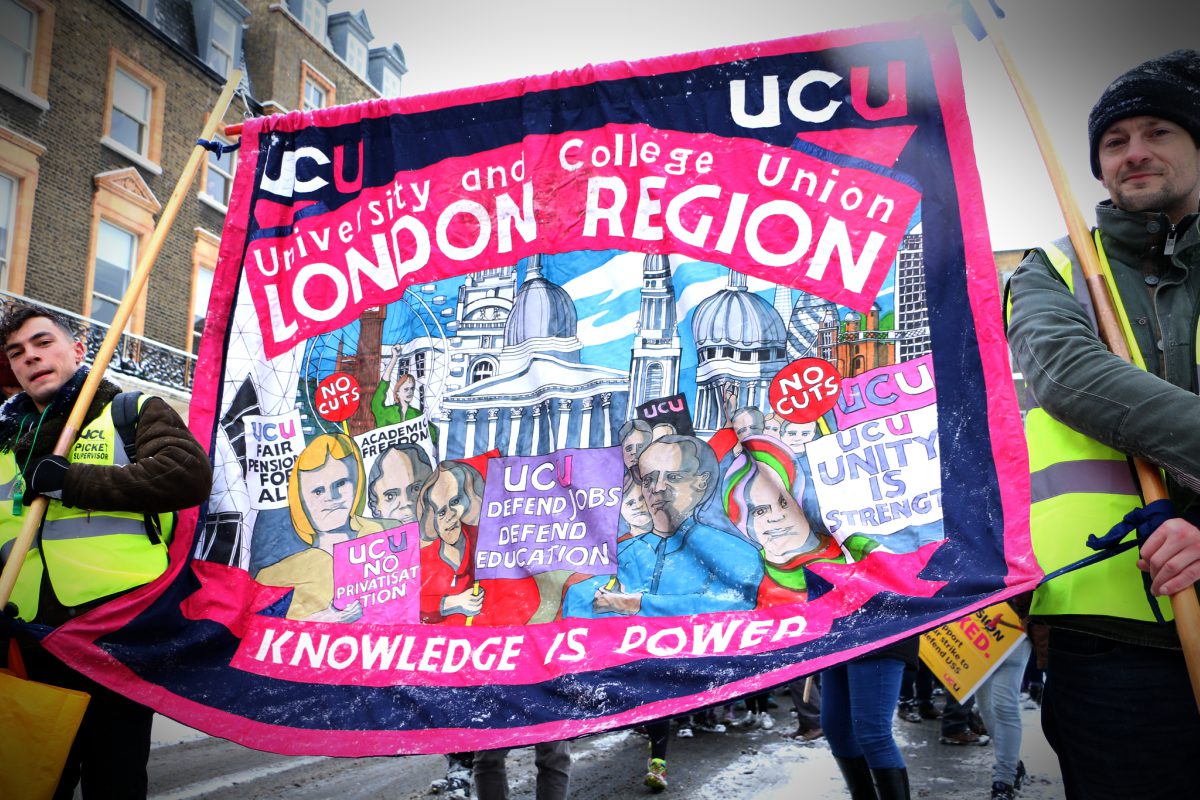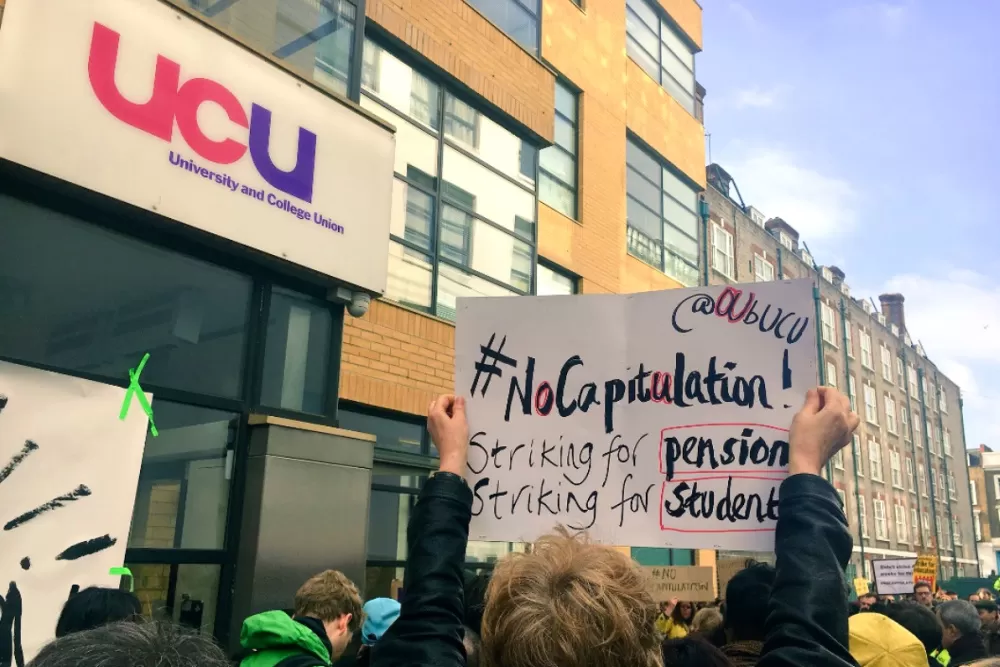UCU members have won a whopping mandate for national strike action in their struggle over pay, conditions, and pensions. With other unions – on campuses and across the movement – also mobilising, the situation calls out for a united fightback.
On 24 October, the Universities and Colleges Union (UCU) announced the results of two aggregated ballots. These have delivered the union its biggest mandate action yet.
The two votes related to disputes over pensions and over pay and conditions. These saw turnouts of 60.2% and 57.8%, respectively.
The support for fighting back could not be clearer. 84.9% voted for taking strike action in the USS pension dispute, and 81.1% voted to strike over pay and working conditions.
The union is therefore in a very strong position. Around 70,000 members in higher education, across 150 branches of the UCU, are now set to take industrial action.
With the UCU rising up on campuses across the country, it is vital that rank-and-file activists are armed with a strategy to win.
Final straw
 This is the third time in just twelve months that UCU members have expressed their determination to fight for an end to pay cuts, zero-hour contracts, dangerously high workloads, and pay discrimination.
This is the third time in just twelve months that UCU members have expressed their determination to fight for an end to pay cuts, zero-hour contracts, dangerously high workloads, and pay discrimination.
This latest vote also comes as the cuts to pensions begin in earnest, despite the USS reporting a surplus of £1.8 billion.
The question of pay has been especially important in this ballot. This has been fuelled by the hardline taken by higher education bosses in the Universities and Colleges Employers Association (UCEA), which has continually offered pay ‘rises’ of 0%, 1%, and most recently 3%.
Needless to say, these pathetic offers are all far below inflation, which officially is running at over 10%.
The ballot also comes off the back of the retaliatory moves made by many vice-chancellors (VCs) over the past year, who have deducted 100% pay from workers who undertook action short of a strike (ASOS) in the last wave of UCU strikes.
Shamelessly, VCs then went on to blame the UCEA for the employers’ intransigence, passing the buck, and lamenting their own powerlessness. In reality, however, the UCEA are the representatives of the university bosses; and it is entirely within the power of VCs to resolve the dispute.
These moves have been the final straw for many UCU members, convincing them the employers are not negotiating in good faith.
At the same time, seeing other unions – such as the RMT and CWU – wage a militant fightback has also been a big factor in giving UCU members the confidence and appetite to turnout and vote for action.
Unite the struggles
 With UCU branches now holding a strong mandate to walk out, the odds are in our favour. The Higher Education Committee (HEC) of the union will now meet on 3 November to decide on how to most effectively utilise this mandate.
With UCU branches now holding a strong mandate to walk out, the odds are in our favour. The Higher Education Committee (HEC) of the union will now meet on 3 November to decide on how to most effectively utilise this mandate.
Importantly, at many institutions, UCU members could be joined by comrades in Unison and Unite. 22 Unison branches already hold a mandate to strike, while Unite branches are balloting at 11 different institutions. The potential scale of industrial action on campuses in the next few months is unprecedented.
As such, the HEC must push to coordinate strike action with these unions, in order to really shut down campuses. There is support for this – after all, the TUC recently voted to build for coordinated strike action at its recent congress.
The University of Sheffield UCU branch has already taken a step in this direction, passing a motion (see below) to coordinate strike action with other campus unions, such as Unite and Unison, in order to completely shut down the university.
The branch will also be forming a joint strike committee with sister unions at the university too.
This should be emulated at universities across the country, in order to bring workers together at a rank-and-file level. This would not only strengthen the struggle in these disputes, but also the wider fight against the marketisation of education.
At our EGM last week we passed a member motion for coordinated strike action across the sector. We are forming a joint strike committee with @UniteUoS and @UnisonUoS to locally coordinate any strike action taken this academic year. 1/4
— Sheffield UCU (@sheffielducu) October 20, 2022
Tories out!
But it’s not just unions in higher education that UCU activists can – and should – coordinate with.
It is likely that action will initially be taken in the week commencing 21 November, which is the earliest possible date to strike before Christmas with the most number of branches. This should be coordinated with postal workers in the CWU, who will be striking on 23, 24 and 25 November.
Joint rallies could then be held, and workers from both unions should be sent to support each other’s picket lines. This would boost both struggles.
Also crucial will be ensuring that there is strong staff-student solidarity, with students actively encouraged to stand on picket lines. After all, students are also getting squeezed by rising costs, while facing course closures and inadequate services due to marketisation.
Furthermore, with unions in secondary education currently balloting – including the NEU and NASUWT, and also headteachers for the first time ever – this latest round of strikes could snowball into an education-wide, or even public-sector wide, strike early next year.
Given this, with tens of thousands of workers and students potentially waging a united struggle, the demands of such a strike must also be explicitly political. This means fighting to bring down the Tories, this government of bosses and billionaires, which is set on attacking the whole working class, implementing yet more austerity, and bringing in further anti-union laws.
Lessons
 The HEC should also reflect on the lessons from recent strikes. Simply escalating action week-to-week, through successive increases in the number of strike days, has proven to be ineffective; incapable of forcing the employers into negotiations, let alone winning our demands.
The HEC should also reflect on the lessons from recent strikes. Simply escalating action week-to-week, through successive increases in the number of strike days, has proven to be ineffective; incapable of forcing the employers into negotiations, let alone winning our demands.
While this strategy took the employers by surprise in 2018, they were prepared for it in the last few rounds of strike action. University bosses simply sat out each strike wave, making use of recorded lectures from previous years, and forcing through exam adjustments in order to soften the impact of lost teaching.
Others have raised the idea of ‘guerilla strike action’, whereby members only strike on days in which they think this will have the greatest impact. But this individualistic approach would only result in an overall weakening of the strike’s strength, damaging the unity of workers on picket lines.
Some, including UCU general secretary Jo Grady, have put forward the perspective of ‘sustained’ action commencing in February, when all branches will have started teaching.
The idea of a marking boycott in the Spring term has also been raised. This could certainly have an impact, but only combined with effective strike action. A marking boycott is not a silver bullet.
And should the bosses impose 100% pay deductions on UCU members again, this must be met with a militant response, mobilising the full strength of the union.
All-out strike
If all of these proposals sound familiar, however, it is because (minus the rolling-regional action) they largely resemble the same strategy deployed over the past year – a strategy that has failed to move us closer to winning.
What is needed instead is indefinite strike action. This would increase the bosses’ uncertainty regarding future revenues and fees, making it difficult for the employers to counteract. Indeed, some branches are already discussing and passing motions that call for indefinite action next term.
This would give the union the opportunity to raise its strike fund – something that Grady has indicated the UCU intends to build anyway. It would also allow time to plan action alongside other unions, and to mobilise support at the rank-and-file level.
With a solid mandate, the union should strive for utmost unity in action, and for hard-hitting action. An indefinite strike, commencing when all universities are back across the country next term, would send a bold message to the employers that the union is serious about winning.
Raising money – we can’t shy away from the fact this is a fight for the future of our sector. We have to plan for the long haul. That’s why we’ll launch a public facing strike fund. I will also write to every union in the UK seeking financial support for UCU members.#ucuRISING
— Jo Grady (@DrJoGrady) October 26, 2022
Fightback
The current mandate is different from that of recent years in a number of important aspects. Not only has it reached the highest turnout ever in a national dispute for the union, meaning that 150 branches will be out together, but the potential for serious coordinated action – on campuses, and across the movement – is greater than ever.
It also comes at a time when, in our so-called ‘democracy’, a prime minister selected by a mere 100 people, representing a tiny elite of billionaires, is set to unleash another wave of “eye-watering” cuts upon the working class, all while pledging to restrict the rights of unions even further, and in the middle of a cost-of-living catastrophe.
The union’s leadership cannot repeat the same mistakes as before and fight alone. Grady has already backed coordinated action in words, acknowledging the need to launch a generalised fightback through the ‘Enough Is Enough’ campaign.
Now is the time to turn these words into a reality, and mobilise the UCU to fight alongside our brothers and sisters across the whole movement: not only for better pay and conditions, but against austerity, against the anti-trade union laws, and against this Tory dictatorship of the bankers and bosses.
Motion on coordinated action passed at University of Sheffield UCU branch
 This branch notes:
This branch notes:
- UoS [University of Sheffield] UCU, Unite, and Unison branches are planning to locally coordinate any strike action taken this academic year.
- Both Unite and Unison had motions for coordinated action submitted to the TUC conference, which would have been discussed last month if the conference had not been postponed. They are now tabled for discussion at the upcoming conference later this month.
- We are in the middle of a national strike wave, with local and national action being taken or balloted across UCU, Unite, Unison. This is the case across the country’s trade unions, with strike action taking place or being balloted for across the NEU, RMT, CWU, GMB, ASLEF, TSSA, CBA, IWGB, and PCS.
This branch believes:
- These fights are united in defending the working class against the cost of rising inflation and energy bills.
- Keeping our unions’ fights separate will only lead to isolation of unions and workplaces.
- National coordinated strike action is the necessary next step for the trade union movement.
This branch resolves to:
- Reach out to local Unite and Unison branches to form a joint strike committee.
- Write a letter to our general secretary and HEC requesting they work with the leadership of Unite and Unison to plan national coordinated action across the education unions. This planning should be open to all other trade unions who wish to coordinate their action.
- Publish and publicise this motion on all social media channels so that other rank-and-file trade union activists can raise and pass similar motions at their branches. This publication should also include a call for local branches to make plans to form joint strike committees to prepare the ground for coordinated action.






